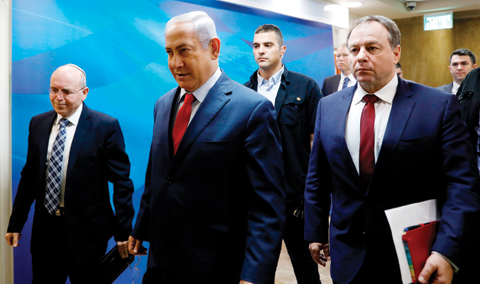Bill grants West Bank settlers Jerusalem voting rights
 JERUSALEM: Israeli Prime Minister Benjamin Netanyahu (center) arrives to chair the weekly cabinet meeting at his Jerusalem office yesterday. —AFP
JERUSALEM: Israeli Prime Minister Benjamin Netanyahu (center) arrives to chair the weekly cabinet meeting at his Jerusalem office yesterday. —AFP
JERUSALEM: US pressure delayed an Israeli ministerial vote yesterday on a proposed bill that Washington fears entails annexation of Jewish settlements near Jerusalem, an Israeli lawmaker said. The "Greater Jerusalem" legislation would put some settlements in the occupied West Bank, built on land Palestinians seek for a future state and viewed as illegal by most countries, under the jurisdiction of Jerusalem's municipality.
The bill, proposed by a member of Prime Minister Benjamin Netanyahu's right-wing Likud party, was to have been submitted for approval yesterday to a ministerial committee on legislation, a first step before a series of ratification votes in parliament. But Likud lawmaker David Bitan, chairman of Netanyahu's coalition in parliament, said a vote by the cabinet committee would be delayed because Washington told Israel the bill's passage could impede US efforts to revive peace talks that collapsed in 2014.
"There is American pressure that claims this is about annexation and that this could interfere with the peace process," Bitan told Army Radio. "The prime minister doesn't think this is about annexation. I don't think so either. We have to take the time to clarify matters to the Americans. Therefore, if the bill passes in a week, or in a month, it's less problematic," he said. Proponents of the legislation say it falls short of formal land annexation to Israel but will enable some 150,000 settlers to vote in Jerusalem city elections. Intelligence Minister Israel Katz, a supporter of the bill, has said this would "ensure a Jewish majority in a united Jerusalem".
Israel's claim to all of Jerusalem as its capital, including the eastern sector it captured along with the West Bank and Gaza Strip in a 1967 Middle East war, has not won international recognition. Palestinians want East Jerusalem as the capital of a state they seek to establish in the West Bank and Gaza Strip. Israeli media reports said the US ambassador to Israel, David Friedman, had conveyed misgivings about the legislation, under which the large Maale Adumim and Beitar Illit settlements would become part of a Greater Jerusalem municipality.
Israel's Haaretz newspaper quoted Netanyahu as telling cabinet ministers yesterday: "The Americans turned to us and inquired what the bill was all about. As we have been coordinating with them until now, it is worth continuing to talk and coordinate with them." A US embassy spokeswoman declined immediate comment. Some 500,000 Israelis live in the West Bank and East Jerusalem, areas home to more than 2.6 million Palestinians. Israel disputes that its settlements are illegal, citing historical, Biblical and political links to the territory, as well as security considerations.
Separately, Israeli prosecutors filed charges yesterday against two Palestinians suspected of murdering their Jewish employer this month in what authorities have labeled a "terror attack", the justice ministry said. According to the indictment, Yousef Kamil, 20, and Mohammed Abu Elrob, 19, both of Qabatiya in the occupied West Bank, murdered Reuven Schmerling in a premeditated attack at their workplace in the Arab Israeli city of Kafr Qasem on October 4.
Schmerling, 70 and who lived in the nearby Israeli settlement of Elkana in the West Bank, was stabbed and beaten to death by the two in his coal warehouse, prosecutors say. According to the charges, the two had decided to "carry out an attack for nationalistic reasons and cause the death of Jews". They were seeking revenge over the death of a friend in 2015, who was shot dead while attempting an attack, prosecutors said. They were also motivated by "the events on the Temple Mount", the Jewish name for the Al-Aqsa mosque compound, the Shin Bet domestic security agency said.
The flashpoint holy site in annexed east Jerusalem was the scene of heightened tensions in July after three Arab Israelis shot dead two policemen nearby. The attack prompted Israel to install new security measures at the entrance to the holy site, leading to deadly unrest. The security measures were later removed. Palestinians viewed the new security measures as Israel asserting further control over the site. The suspects decided that Schmerling would be their victim because of "anger towards him stemming from their work relations", the indictment read.
After stabbing Schmerling and beating him to death with a fan and a pickaxe in his warehouse, Kamil and Abu Elrob showered and took a taxi back to Qabatiya, the charge sheet read. A wave of unrest that erupted in October 2015 has claimed the lives of at least 295 Palestinians or Arab Israelis, 51 Israelis, two Americans, two Jordanians, an Eritrean, a Sudanese and a Briton, according to an AFP toll. However, the violence has largely subsided in recent months. Israeli authorities say most of the Palestinians killed were carrying out knife, gun or car-ramming attacks. Others were shot dead in protests and clashes, while some were killed in Israeli air strikes on the Gaza Strip.- Agencies




